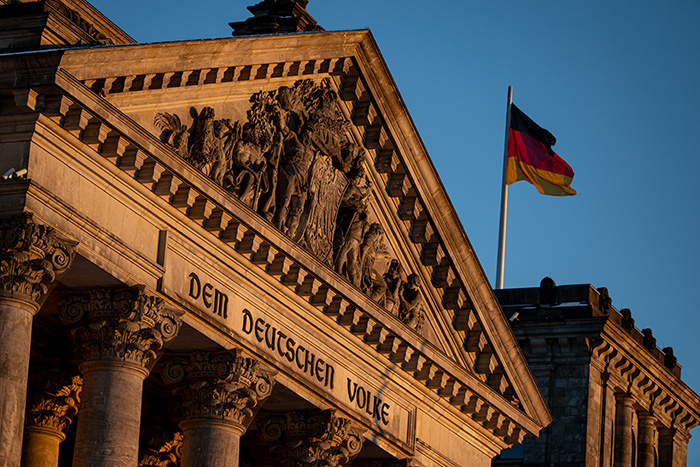Interviews / Observatory of Germany
21 February 2025
German Federal Elections: What Are the Country’s Prospects?

This Sunday, 23 February, German citizens will elect a new Bundestag, the country’s parliamentary assembly, renewing all 630 seats. This snap election, triggered by a political crisis that led to the collapse of the ruling coalition in November, is crucial and could result in the departure of Social Democratic Chancellor Olaf Scholz.
The context in which the election takes place—marked by terrorist attacks and economic crisis—could also lead to a historic result for the far-right party Alternative für Deutschland (AfD).
What are the political dynamics at play in the country? What impact could the fall of the current government have on Germany’s support for Ukraine? How might bilateral relations with France evolve?
Jacques-Pierre Gougeon, university professor, research director at IRIS, director of the Observatory of Germany, and author of « L’Allemagne, un enjeu pour l’Europe » (Eyrolles, 2024) provides insights.
What political dynamics are shaping the run-up to Germany’s federal elections on 23 February?
Several political dynamics are shaping this campaign and reshaping Germany’s political landscape. The conservative CDU (Christian Democratic Union), along with its CSU (Christian Social Union) ally, holds a strong advantage in the election race.
This dominance is due to several factors. Firstly, the unpopularity of outgoing Chancellor Olaf Scholz is exceptionally high, with only 23% of Germans satisfied with his performance. Secondly, Germany’s economic crisis plays a central role after two years of declining growth (i.e., a recession) and structural difficulties in the industrial sector. The announcement of multiple mass layoffs has unsettled public opinion. The cut of 35,500 jobs at Volkswagen is just the tip of the iceberg, as further layoffs at Thyssen (-11,000 jobs), Bosch (-5,500 jobs), and many other companies—including large SMEs, traditionally the pride of Germany—add to the economic distress.
The transition to a “green economy” is also perceived as too fast and too harsh, with insufficient support for affected industries and the withdrawal of financial aid due to budgetary constraints.
Additionally, the recent wave of deadly attacks in Germany has intensified criticism of the government, particularly on two fronts: insufficient attention to security concerns and the lack of a coherent migration policy to control immigration flows. 60% of Germans believe there is too much immigration in the country. These weaknesses are being exploited not only by the CDU but also by the far-right Alternative für Deutschland (AfD), which ranks second behind the CDU/CSU in the polls, far surpassing the Social Democrats, despite its highly radical stance on immigration and German identity.
Germany, as it prepares to choose its chancellor, is a country in doubt. In a nation where political stability has been a defining characteristic since 1949, 69% of the population is worried about the stability of the future government, and 46% perceive a lack of social cohesion. Not only is the German economic “model” struggling, but society itself is questioning its resilience and unity.
Donald Trump and Vladimir Putin have recently begun negotiations to end the war in Ukraine, without involving European countries or even Ukraine itself for now. What position might Germany, significantly weakened economically by the conflict, take?
It may seem paradoxical, but this economically weakened Germany intends to exert more influence in Europe. This idea is reflected in the various party platforms, particularly that of the CDU. The party has criticized the outgoing chancellor for neglecting European issues, thereby diminishing Germany’s standing, despite its commitment to rearmament and its position as Europe’s largest economy and the world’s third-largest economic power.
During the last televised debate between the candidates for chancellor, CDU candidate Friedrich Merz accused Olaf Scholz of being “just a guest” at the Ukraine meeting organized last Monday in Paris by Emmanuel Macron, adding: “That is not the role I envision for Germany. We must become strong.” For Scholz’s opponents, Germany cannot merely remain the second-largest provider of aid to Ukraine without exerting greater influence over events. This clearly implies being less hesitant about the types of weapons delivered to Ukraine.
Friedrich Merz, for instance, has suggested he would be more flexible regarding the delivery of German-made Taurus cruise missiles, which have a 500 km range, making it possible to strike Russian territory from Ukraine. However, the decision will not be easy, as 60% of Germans oppose sending these weapons to Ukraine.
If Germany shifts its stance, it will likely involve a renewed transatlantic relationship from Berlin’s perspective. Friedrich Merz believes he could have greater influence over Donald Trump and his administration than Olaf Scholz. It is also worth noting that the United States reclaimed its position as Germany’s top trading partner last year, with a trade surplus of €71 billion in Germany’s favor.
As the Franco-German “engine” struggles to function, what impact could the German federal elections have on the relationship between Paris and Berlin, as well as on the balance and cohesion of the European Union?
The Franco-German relationship has undoubtedly suffered in recent years, despite numerous official celebrations, which ultimately do not always provide much help beyond maintaining historical markers. The two countries have clashed on multiple issues, including energy, the Mercosur free trade agreement, the role and evolution of NATO, and relations with China. Neither country, both weakened, is currently in a position to exercise leadership in Europe, which poses a problem in terms of cohesion and balance.
In addition, Germany increasingly sees France as an important partner, but one among others. It is particularly interesting to observe that, in German political programmes and discourse, France and Poland are now treated as equals. As a result, the relationship with France has become more ordinary.
These German federal elections could potentially provide an opportunity for a revival of the Franco-German relationship, particularly in light of the changing political landscape in the United States and the evolving transatlantic relationship, which Germany questions while remaining historically attached to it. However, it is clear that this relationship must evolve and likely needs to modify its functioning and regulatory mechanisms, which have become overly cumbersome in many areas.

